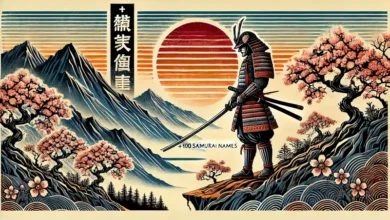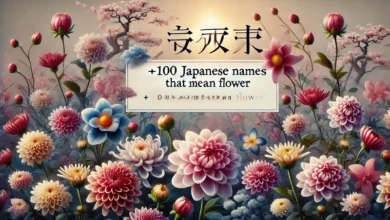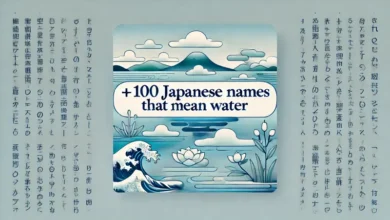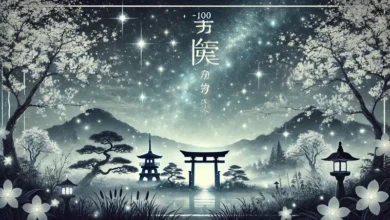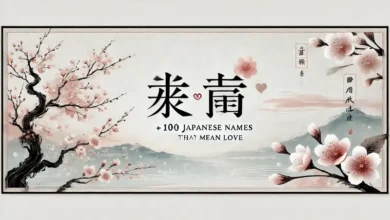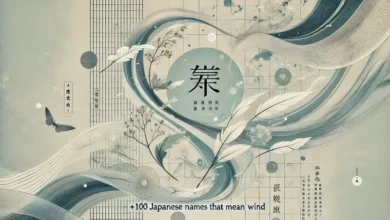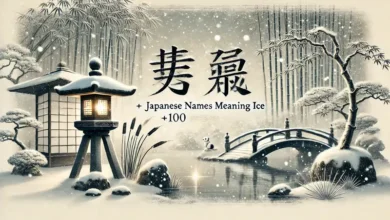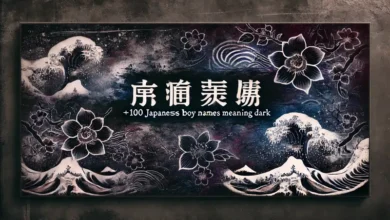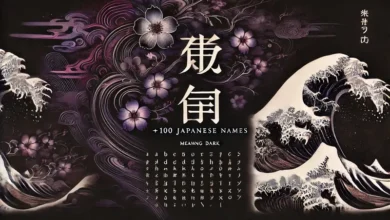Japanese names that mean fire (+159 Female, Male, Dragon,…)
For copy name or description, please click on that!
| Name | Description |
|---|---|
Natsuhi (夏火) | “Summer fire,” directly linking the warmth of summer to the concept of fire. |
Haruki (春樹) | “Spring trees,” symbolizing new growth and the warmth of spring, which follows the cold. |
Ensho (炎焼) | “Burning flame,” a dragon whose fire can burn anything. |
Hiyaku (火躍) | “Fire leap,” a spirit that dances with flames. |
Ryo (涼) | “Cool,” but in the context of fire, it can symbolize the cooling of ashes. |
In Japan, names are imbued with meaning, carrying hopes and expectations for the bearer. Fire, a powerful symbol of passion, transformation, and illumination, features prominently in many Japanese names. Whether you’re seeking a name that evokes warmth and strength, or a name that hints at fleeting beauty and inspiration, this list will guide you through a selection of captivating Japanese names that embody the essence of fire.
Female Japanese Names That Mean Fire
- Hiyori (日和) – Meaning “sunny weather” but suggests the warmth of the sun.
- Hinata (陽向) – Literally means “towards the sun,” implying warmth and light.
- Akane (茜) – Means “deep red,” reminiscent of fire’s hue.
- Homura (焔) – Means “flame,” directly associating with fire.
- Himari (火鞠) – “Fireball,” suggesting a strong and fiery spirit.
- Kaen (火炎) – Literally means “blaze,” signifying intense fire.
- Kagari (篝火) – Means “bonfire,” evoking images of communal fires.
- Ena (炎菜) – Combining “flame” and “greens,” suggesting a fiery nature with growth.
- Hinako (陽菜子) – “Child of the sun,” representing warmth and life.
- Honoa (炎亜) – “Flame, Asia,” symbolizing fire with an Asian essence.
- Fuyuka (冬火) – “Winter fire,” representing warmth in the cold.
- Hiromi (火美) – “Beautiful fire,” denoting the beauty in flames.
- Hotaru (蛍) – Means “firefly,” a natural light in the darkness.
- Itsuki (樹火) – “Tree fire,” symbolizing fire’s ability to consume nature but also its light.
- Kanade (奏火) – “Play (music) fire,” suggesting the passion of playing music.
- Kou (光) – Means “light,” evoking the brightness of fire.
- Moeka (萌火) – “Budding fire,” representing the start of a flame.
- Rin (凛火) – “Dignified fire,” suggesting a fire with presence.
- Sumika (澄火) – “Clear fire,” denoting purity and clarity in flames.
- Yuki (勇気) – While it means “courage,” it can symbolize the bravery of fire.
Male Japanese Names That Mean Fire
- Kaoru (薫) – Means “fragrance” but suggests warmth.
- Atsushi (篤志) – “Sincere warmth,” implying a warm-hearted individual.
- Fumiya (文矢) – “Literary arrow,” but with “Fumi” suggesting warmth.
- Haru (春) – Means “spring,” a season that brings warmth after winter.
- Isamu (勇) – Means “courage,” akin to the bravery of facing fire.
- Kaito (海斗) – “Sea, big dipper,” but the sound evokes a feeling of openness like a blaze.
- Kenji (健司) – “Healthy ruler,” where health can be seen as a form of inner fire.
- Masaru (勝) – Means “victory,” suggesting the triumph of fire.
- Natsu (夏) – Means “summer,” the hottest season, evoking warmth.
- Raiden (雷電) – “Thunder and lightning,” elements often associated with storm fires.
- Sora (空) – Means “sky,” symbolizing the vastness where the sun resides.
- Taiga (大河) – “Great river,” but sounds like “tiger,” a creature with a fiery spirit.
- Takumi (匠) – “Artisan,” suggesting the fire of creativity.
- Yamato (大和) – “Great harmony,” but evokes a strong, fiery spirit of unity.
- Youta (陽太) – “Sun, thick,” representing the strong presence of the sun.
- Ryo (遼) – Means “distant,” but can imply the far-reaching warmth of the sun.
- Shinji (真二) – “True second,” suggesting authenticity and the fire within.
- Tadashi (正) – Means “correct,” symbolizing the guiding light of fire.
- Yuji (勇二) – “Courage second,” where courage is akin to fire’s spirit.
- Hikaru (光) – Means “light,” directly associated with the brightness of fire.
Unisex Japanese Names That Mean Fire
- Hikari (光) – “Light,” representing the brightness of fire.
- Kaoru (薫) – “Fragrance,” often associated with the warm scent of woodfire.
- Akari (明かり) – “Brightness” or “light,” akin to the glow of flames.
- Haruki (春樹) – “Spring trees,” symbolizing new growth and the warmth of spring, which follows the cold.
- Rin (凛) – “Dignified,” suggesting the impressive nature of a fire.
- Asahi (朝日) – “Morning sun,” representing the warmth and light of the sun at dawn.
- Minato (湊) – “Harbor,” where light signals and fires guide the way.
- Yuki (雪) – Traditionally means “snow,” but metaphorically can represent a cool fire, symbolizing contrast.
- Sora (空) – “Sky,” evoking the vastness and the warmth of the sun above.
- Nagi (凪) – “Calm,” like the peaceful state of embers in a dying fire.
- Kou (光) – Another form of “light,” versatile for any character embodying the light or warmth of fire.
- Rei (麗) – “Beautiful,” but can also suggest the mesmerizing beauty of flames.
- Shin (真) – “Truth,” representing the purifying aspect of fire.
- Touma (灯真) – “Lamp of truth,” combining light and purity, akin to the revealing nature of fire.
- Hinote (火の手) – “Flames,” directly referencing fire.
- Kai (灰) – Though it means “ash,” it symbolizes the aftermath of fire, carrying memories of its warmth.
- Ryo (涼) – “Cool,” but in the context of fire, it can symbolize the cooling of ashes.
- Aoi (碧) – “Blue,” like the hottest part of the flame.
- Kiyomi (清見) – “Pure view,” akin to the clarity and purification fire provides.
- Mao (真央) – “True center,” like the heart of a fire.
- Nobu (信) – “Trust,” like the reliability of fire for warmth and cooking.
- Hiromi (広海) – “Wide sea,” suggesting the spread of fire.
- Itsuki (樹) – “Trees,” which fuel fire, representing growth and energy.
- Mizu (水) – “Water,” seemingly opposite but essential for balancing fire’s intensity.
- Noa (乃亜) – “My love,” as fire represents passion and warmth.
- Haru (春) – “Spring,” a season symbolizing the renewal that comes after fire.
- Ren (蓮) – “Lotus,” which grows from murky water, symbolizing beauty and rebirth from ashes.
- Sou (蒼) – “Blue,” again representing the intense heat of flames.
- Taiki (大輝) – “Great radiance,” likened to the brilliance of a large fire.
- Yuuma (勇真) – “Brave truth,” embodying the courage and purity fire symbolizes.
- Kiri (霧) – “Mist,” which can rise from the warmth of fire meeting cool air.
- Manato (真夏人) – “Person of midsummer,” evoking the heat and energy of summer fires.
- Riku (陸) – “Land,” where fire can both destroy and rejuvenate.
- Saku (作) – “Blossom,” representing the new life that springs forth after a fire.
- Tsubasa (翼) – “Wings,” symbolizing the ability of fire to ascend and transform.
- Yuma (夢真) – “Genuine dream,” reflecting the inspirational aspect of fire.
- Kanna (寛那) – “Relaxing warmth,” like the comforting presence of a hearth.
- Mirai (未来) – “Future,” signifying the guiding light of fire towards what lies ahead.
- Ryou (遼) – “Distant,” like the far-reaching effect of light and warmth.
- Seiji (青司) – “Blue administrator,” where blue flames are the hottest and most intense.
- Toma (冬真) – “True winter,” representing warmth in the coldest season.
- Yukihiro (雪弘) – “Snow widespread,” a name that plays on the contrast between the cold of snow and the warmth of fire.
- Zen (善) – “Good,” akin to the beneficial aspects of fire.
- Aki (秋) – “Autumn,” a season associated with warmth, harvest, and the changing colors of leaves reminiscent of flames.
- Chika (力加) – “Power plus,” suggesting the strength and energy provided by fire.
- Hiro (寛) – “Tolerant,” like the encompassing warmth of fire.
- Iku (生) – “Life,” as fire is essential for life and growth.
- Kanon (花音) – “Flower sound,” where flowers can symbolize the fleeting nature of flames.
- Makoto (誠) – “Sincerity,” representing the honest and raw nature of fire.
- Natsuhi (夏火) – “Summer fire,” directly linking the warmth of summer to the concept of fire.
Japanese Name Meaning Fire Dragon
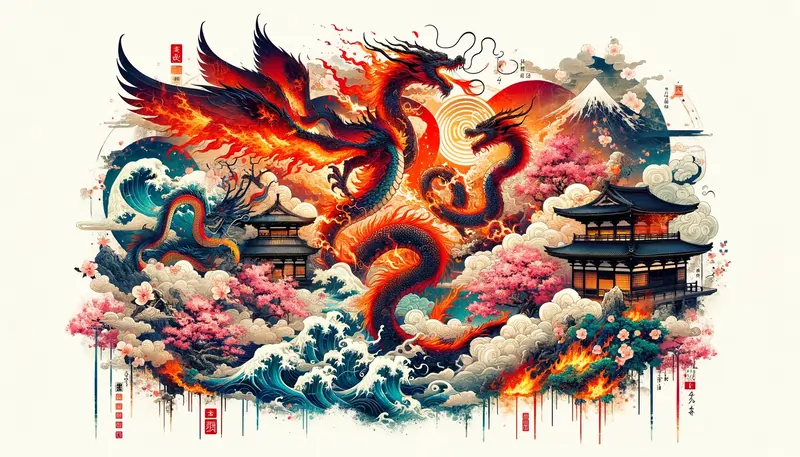
Male Names
- Kairyu (火龍) – “Fire dragon,” a straightforward combination symbolizing a powerful, fiery dragon.
- Enryu (炎龍) – “Flame dragon,” emphasizing a dragon that embodies flames.
- Hinoryu (火の竜) – “Dragon of fire,” denoting a dragon that commands or is made of fire.
- Homuraotoko (焔男) – “Blaze man,” a dragon man with the soul of blazing fire.
- Ryuen (龍炎) – “Dragon flame,” indicating a dragon that breathes intense flames.
- Hirotora (火虎) – While “tora” traditionally means tiger, this name suggests a fiery beast with dragon-like qualities.
- Karyudo (火竜道) – “Path of the fire dragon,” symbolizing a journey or life dedicated to mastering the fire dragon’s strength.
- Tatsuhiko (竜火子) – “Child of dragon fire,” a name for someone born with the spirit of a fire dragon.
- Enjin (炎神) – “Flame god,” a divine dragon associated with fire.
- Ryuka (龍火) – “Dragon fire,” emphasizing the fire aspect of the dragon.
Female Names
- Himiko (火美子) – “Beautiful child of fire,” with a dragon’s fierce spirit.
- Karyuka (火竜花) – “Fire dragon flower,” symbolizing beauty and ferocity.
- Enka (炎華) – “Flame flower,” a dragon with the elegance and destructiveness of fire.
- Ryumi (龍美) – “Beautiful dragon,” with a fire dragon’s elegance.
- Hinami (火波美) – “Beautiful fire wave,” like the majestic movement of a dragon’s flame.
- Homurami (焔美) – “Beauty of blaze,” representing a dragon’s dazzling fire.
- Fuka (風火) – “Wind and fire,” a dragon that controls both elements.
- Ryuho (龍炎) – “Phoenix fire,” a mythical bird that resonates with the rebirth theme, akin to a fire dragon.
- Karyubi (火竜美) – “Beauty of the fire dragon,” combining fierceness with grace.
- Enako (炎子) – “Child of flame,” embodying the spirit of a fire dragon.
Unisex Names
- Ryuto (竜燈) – “Dragon lamp,” suggesting a dragon that lights the way with fire.
- Hinote (火乗) – “Riding the fire,” a name for those who harness the power of fire dragons.
- Ensei (炎星) – “Flame star,” a dragon that shines as brightly as a star with its fire.
- Tatsuhiro (竜広) – “Wide dragon,” implying the vast power of a fire dragon.
- Ryuki (龍輝) – “Shining dragon,” a dragon that glows with the light of fire.
- Hinoryo (火の涼) – “Cool fire,” a paradoxical name suggesting a dragon that controls fire so masterfully it can cool it.
- Kasai (火災) – While it means “fire disaster,” it symbolizes a dragon’s destructive power.
- Ryushin (龍心) – “Heart of the dragon,” the core of a fire dragon’s strength.
- Homuraryo (焔龍) – “Blaze dragon,” a variant emphasizing the blazing aspect of a dragon’s fire.
- Enryaku (炎樂) – “Pleasure of flames,” a dragon that finds joy in the dance of flames.
Additional Names
- Karyuji (火竜児) – “Fire dragon child,” born with the essence of a fire dragon.
- Ryumai (龍舞) – “Dragon dance,” like the graceful, fiery dance of a dragon in the sky.
- Ensho (炎焼) – “Burning flame,” a dragon whose fire can burn anything.
- Hiyaku (火躍) – “Fire leap,” a dragon that leaps amidst flames.
- Ryutai (竜態) – “Dragon form,” one who transforms into or embodies the form of a fire dragon.
- Tatsuya (竜矢) – “Arrow of the dragon,” flying swift and fiery like a dragon’s breath.
- Ryuji (竜司) – “Dragon ruler,” one who commands dragons of fire.
- Enshin (炎心) – “Flame heart,” the passionate heart of a fire dragon.
- Karyusei (火竜星) – “Fire dragon star,” a celestial dragon associated with fire.
- Ryusen (龍泉) – “Dragon spring,” like the source of a dragon’s fire power.
Japanese Name For Fire Spirit
Male Names
- Hinorei (火の霊) – “Spirit of fire,” embodying the essence of fire.
- Enshin (炎心) – “Flame heart,” representing a passionate spirit.
- Kaika (灰火) – “Ash and fire,” symbolizing rebirth from ashes.
- Homurasei (焔精) – “Blaze spirit,” a powerful fire essence.
- Ryouka (燎火) – “Burning flame,” a spirit that guides through darkness.
- Hikarurei (光る霊) – “Shining spirit,” a radiant fire entity.
- Toumaru (灯丸) – “Lamp circle,” a protective fire spirit.
- Kagaribi (篝火) – “Bonfire,” representing communal warmth and spirit.
- Enji (炎児) – “Flame child,” a young and vibrant spirit of fire.
- Hiyaku (火躍) – “Fire leap,” a spirit that dances with flames.
Female Names
- Hinoko (火の子) – “Child of fire,” a spirit born from flames.
- Akari (明かり) – “Brightness,” evoking the light of fire.
- Ena (炎菜) – “Flame greens,” symbolizing life nourished by fire.
- Kohaku (琥珀) – “Amber,” representing the beauty of fire captured in stone.
- Homuraiko (焔姫子) – “Princess of flames,” a regal fire spirit.
- Reika (霊火) – “Spiritual fire,” a divine presence within the flames.
- Shinku (真紅) – “Crimson,” as vibrant as the core of a fire.
- Himari (火鞠) – “Fireball,” symbolizing a bold and energetic spirit.
- Fuka (風火) – “Wind and fire,” a spirit that embodies both elements.
- Enrin (炎輪) – “Flame circle,” protection and warmth.
Unisex Names
- Hinoreiki (火の霊気) – “Aura of fire,” the atmosphere created by a fire spirit.
- Enshou (炎昇) – “Rising flame,” a spirit ascending with warmth.
- Kasumi (霞) – “Mist,” evoking the steam of fire meeting water, a spiritual fusion.
- Rinrei (凛霊) – “Dignified spirit,” a noble presence in the flames.
- Hienu (火絵布) – “Fire painted cloth,” artistry in flame.
- Takibi (焚火) – “Campfire,” a spirit that gathers and nurtures.
- Noroi (炎麗) – “Flame beauty,” the aesthetic spirit of fire.
- Kouen (光炎) – “Light flame,” a luminous fire entity.
- Shouka (焼火) – “Burning fire,” transformation and renewal.
- Enmu (炎夢) – “Flame dream,” an aspirational fire spirit.
Additional Names
- Hinataki (日炎滝) – “Sunfire waterfall,” a cascading spirit of light and fire.
- Homurabi (焔日) – “Blaze sun,” a spirit that commands daylight.
- Ensei (炎精) – “Flame spirit,” embodying the essence of fire.
- Rensa (連炎) – “Chain flame,” a spirit linking fires together.
- Kien (希炎) – “Hope flame,” a spirit bringing light to darkness.
- Hinotama (火の玉) – “Fireball,” a spirited orb of fire.
- Suzaku (朱雀) – “Vermilion bird,” a mythical fire spirit bird.
- Kirabi (煌火) – “Sparkling fire,” a spirit of dazzling flames.
- Reiyaki (霊焼き) – “Spiritual burning,” purification through fire.
- Enten (炎天) – “Blazing sky,” a spirit that dominates the heavens.
So there you have it! From blazing boldness to flickering creativity, these Japanese names capture the multifaceted essence of fire. Remember, choosing a name is a significant decision, so delve deeper into the meanings and pronunciations that resonate with you. With a fire-inspired name, you might just ignite a passion within the bearer, reminding them of the potential for warmth, transformation, and inner light.

